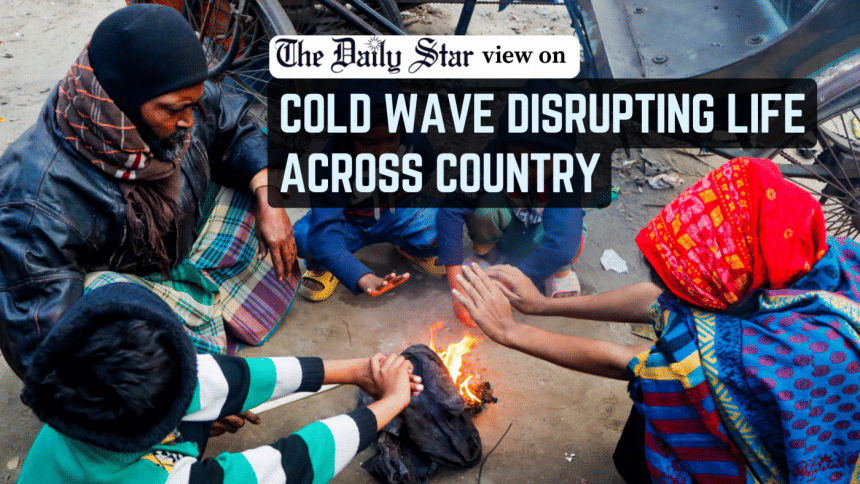The poor need help amid sweeping cold

We are concerned about the ongoing cold wave that has brought hardship and suffering across the country. Reports from various regions show how plummeting temperatures, combined with chilly winds and dense fog, are disrupting daily lives, livelihoods, and transportation. Weather forecasts indicate that the cold weather may persist throughout January, with moderate to severe spells expected to affect large parts of the country intermittently. What this means for the poor and low-income groups—who must venture outdoors for work but are least equipped to do so—is not hard to understand. This is yet another reminder of how extreme weather conditions, whether cold or hot, disproportionately impact the vulnerable in our society.
In Dhaka, where temperatures plunged on consecutive days, the impact has been equally severe. While many have stayed indoors over the weekend, many others suffered under the open sky or in poorly insulated homes and shelters. There was no respite for low-income workers, such as rickshaw-pullers and vegetable vendors, either. Many were also seen to light makeshift fires under flyovers or in open spaces to stay warm. They were battling not just discomfort but also serious health risks. Reportedly, there has been a surge in cold-related illnesses—including pneumonia, respiratory infections, and diarrhoea—with the International Centre for Diarrhoeal Disease Research, Bangladesh (icddr,b) reporting a 25 percent increase in paediatric cases of diarrhoea compared to last year. Even deaths have been recorded.
In Dhaka, where temperatures plunged on consecutive days, the impact has been equally severe. While many have stayed indoors over the weekend, many others suffered under the open sky or in poorly insulated homes and shelters. There was no respite for low-income workers, such as rickshaw-pullers and vegetable vendors, either. Many were also seen to light makeshift fires under flyovers or in open spaces to stay warm. They were battling not just discomfort but also serious health risks.
Hospitals in the northern districts have similarly reported a spike in cold-related illnesses. The situation in this region has been particularly punishing for both humans and animals, with Panchagarh's Tetulia recording the country's lowest temperature of 8.3 degrees Celsius on Friday morning. Clearly, these vulnerable regions, and those most exposed to the cold in other areas, require special attention. The immediate priority is to intensify relief efforts including the distribution of blankets and warm clothing among the poor. It is reassuring to learn that 679,000 blankets have been allocated from the Chief Adviser's Relief Fund for distribution, while approximately Tk 33 crore has been allocated by the Ministry of Disaster Management and Relief to purchase additional blankets. These efforts, along with volunteer initiatives by citizen groups, will need to be expanded if the cold weather persists as forecasted.
It is vital that all relief efforts are streamlined and coordinated to ensure that aid reaches those who most need it. During the recent floods, we saw how uncoordinated efforts exacerbated victims' suffering instead of alleviating it. Such disorganisation must not recur this time. As the cold deepens, our collective response must rise to meet the challenge.


 For all latest news, follow The Daily Star's Google News channel.
For all latest news, follow The Daily Star's Google News channel. 









Comments